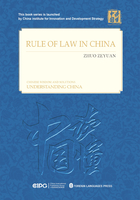
Chapter 5. Wu Tingfang: First Generation Jurist in Modern China
Wu Tingfang was another important Minister of Law of the late Qing Dynasty. He was two years younger than Shen Jiaben. He was appointed together with Shen as the Secretary of Enactment.
Born in Singapore on July 30, 1842, he returned to China with his father and settled in Guangzhou. At the age of 13, he went alone to study at the Anglican St. Paul’s College in Hong Kong and graduated with honors six years later. In 1862, he served as an interpreter in the Hong Kong Magistrate’s Court. In 1874, he studied law at University College London at his own expense, and became a barrister in the UK after graduation.
In February 1877, Wu returned to Hong Kong to practice law. He was the first ethnic Chinese barrister admitted in the British colony. On December 16, 1878, he was officially appointed as the Justice of the Peace (JP), the first ethnic Chinese in that position.
On February 19, 1880, as recommended by Hong Kong Governor John Hennessy and the ethnic Chinese leaders in Hong Kong, Wu Tingfang became the first ethnic Chinese member of the Legislative Council since the establishment of Hong Kong as a commercial port. Wu supported Hennessy’s enlightened policy and opposed discrimination against ethnic Chinese. He tried to abolish public whipping and demanded a ban on child trafficking. Wu made important contributions to Hong Kong’s business development, urban construction and social welfare.
In 1896, Wu Tingfang served as Minister of the Qing government to the United States, Spain, and Peru. In 1902, he returned to China and obtained the rank of upper fourth (in a system of nine numbered ranks, each subdivided into upper and lower levels). He served successively as the Secretary of Enactment, Minister of Commerce, Vice Minister of Foreign Affairs, and Vice Minister of Justice. He co-chaired the law revision with Shen Jiaben, during which he pushed for the introduction of a comprehensive Western legal system and got the support of Shen Jiaben.
In October 1911, after the Xinhai Revolution, Wu Tingfang immediately announced his support for the Republic and sent a letter to the Qing government to advise the emperor to abdicate. He participated in the peace negotiations on the revolutionaries’ behalf. After his resignation from office, he returned home and wrote The New Laws of Yanshou, Thoughts on State Governance of the Republic of China, and America, Through the Spectacles of an Oriental Diplomat. When he learned that Yuan Shikai was being encouraged to restore the monarchy, he said in a speech:
“The existing government in Peking is only a theater. The bureaucrats of all levels are only actors. We can watch the actors, but we really cannot believe what they say.... You can ask the passers-by if there’s anyone who would like an emperor. We must persist – whatever the year is named, be it Hongxian (Tr. Yuan Shikai proclaimed himself as the Hongxian Emperor in 1915), or Xianhong, our understanding is that this is the fifth year of the Republic of China, and the next year will be the sixth. We must maintain this for tens of thousands of years!”
In 1912, Sun Yat-sen was appointed as the Provisional President of the Republic of China, and the Nanking Provisional Government was established. Wu Tingfang was appointed as the Minister of Justice and continued to work on legal reform, with the strong support of Sun Yatsen. Wu Tingfang advocated learning from the West to establish a new legal system, including a system of lawyers, and actively promoted the defense function of lawyers. Under his leadership, a series of laws and regulations were enacted.
In 1916, he served as Minister of Foreign Affairs in Duan Qirui’s cabinet. The next year, he served as the Acting Premier. However, he would soon be dismissed for refusing to sign the order to dissolve the parliament. When he came to Shanhaiguan and learned about Zhang Xun’s restoration attempt, he made up his mind to completely break with the Beiyang government. He went to Guangdong to find a new way, joining Sun Yat-sen in the Constitutional Protection Movement, and served as Sun’s Minister of Foreign Affairs.
In 1921, he served as Minister of Foreign Affairs and Finance of the Guangzhou Military Government. During the Northern Expedition, he was the acting president in Sun’s absence. Wu Tingfang died on June 23,1922. Sun Yat-sen, who was seeking refuge on board Yongfeng (a ship), was deeply saddened. He said this in pain:
“Minister Wu has died for me, and for us all. He lived a glorious life. Although he has withered away, we must stay committed and united as one for our nation. But I’m afraid there will be no one like him again. What all of us can do is to muster up courage and follow his footsteps to defeat all enemies. Only in this way can we as followers fulfill our mission and let him rest in peace.”
As men of law, living in that particular historical period could be deemed either as a kind of fortune or misfortune. In such a context, they dedicated their lives to the country and the people, which would be admired and respected by later generations. Having talked about Shen Jiaben and Wu Tingfang, we’ll move on to Kang Youwei and Liang Qichao. We should hail the fact that this era forged one talent after another, each of whom would rule his own domain for decades to come.